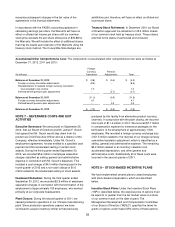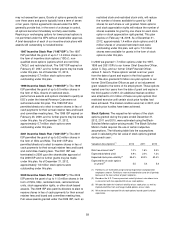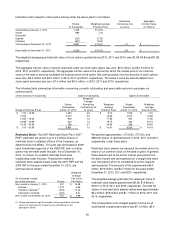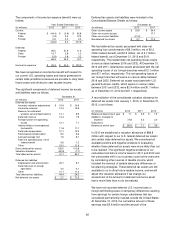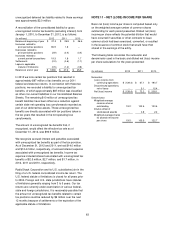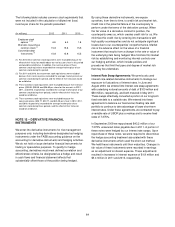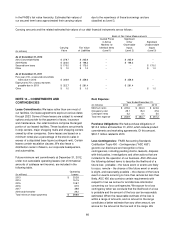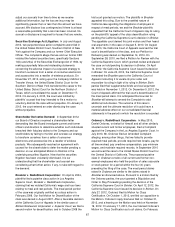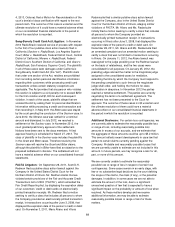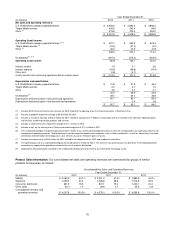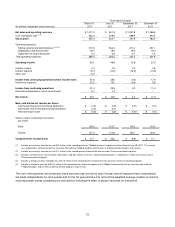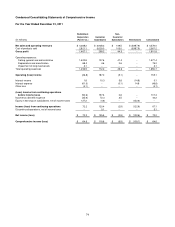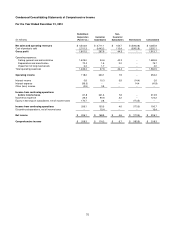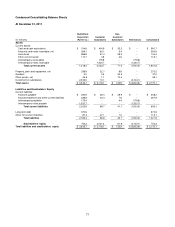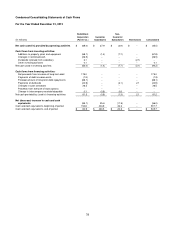Radio Shack 2012 Annual Report Download - page 70
Download and view the complete annual report
Please find page 70 of the 2012 Radio Shack annual report below. You can navigate through the pages in the report by either clicking on the pages listed below, or by using the keyword search tool below to find specific information within the annual report.
68
4, 2013, Ordonez filed a Motion for Reconsideration of the
court’s denial of class certification with regard to the rest
period claim. The outcome of this case is uncertain and the
ultimate resolution of it could have a material adverse effect
on our consolidated financial statements in the period in
which the resolution is recorded.
Song-Beverly Credit Card Act Litigation: In November
2010 RadioShack received service of process with respect
to the first of four putative class action lawsuits filed in
California (Sosinov v. RadioShack, Los Angeles Superior
Court; Bitter v. RadioShack, Federal District Court, Central
District of California; Moreno v. RadioShack, Federal
District Court, Southern District of California; and Grant v.
RadioShack, San Francisco Superior Court). The plaintiffs
in all of these cases seek damages under California’s
Song-Beverly Credit Card Act (the “Act”). Plaintiffs claim
that under one section of the Act, retailers are prohibited
from recording certain personal identification information
regarding their customers while processing credit card
transactions unless certain statutory exceptions are
applicable. The Act provides that any person who violates
this section is subject to a civil penalty not to exceed $250
for the first violation and $1,000 for each subsequent
violation. In each of the cases, plaintiffs allege that we
violated the Act by asking them for personal identification
information while processing a credit card transaction and
then recording it. In May 2011 the Bitter case was stayed
by the court pending the conclusion of the Sosinov case. In
June 2012, the Moreno case was settled for a nominal
amount and dismissed. In July 2012, we reached a
settlement of the Sosinov case. In November 2012, the
court granted preliminary approval of the settlement.
Notices have been sent to the class members. A final
approval hearing is scheduled for March 27, 2013. The
class of plaintiffs in the Sosinov case includes the plaintiffs
in the Grant and Bitter cases. Therefore resolving the
Sosinov case will resolve the Grant and Bitter claims,
although the plaintiffs in Bitter have filed an objection to the
proposed settlement in Sosinov. The settlement will not
have a material adverse effect on our consolidated financial
statements.
FACTA Litigation: On September 26, 2011, Scott D.H.
Redman filed a putative class action lawsuit against the
Company in the United States District Court for the
Northern District of Illinois. Mr. Redman claims that we
violated certain provisions of the Fair and Accurate Credit
Transactions Act of 2003 (“FACTA”), which amended the
Fair Credit Reporting Act, by displaying the expiration dates
of our customers’ credit or debit cards on electronically
printed transaction receipts. Mr. Redman filed a motion
seeking to certify a class that includes all persons to whom
the Company provided an electronically printed transaction
receipt, in transactions occurring after June 3, 2008, that
displayed the expiration date of the person’s credit or debit
card. On November 3, 2011, Mario Aliano and Vitoria
Radavicuite filed a similar putative class action lawsuit
against the Company, also in the United States District
Court for the Northern District of Illinois, alleging similar
violations of FACTA. Mr. Aliano and Ms. Radavicuite
initially filed a motion seeking to certify a class that includes
all persons to whom the Company provided an
electronically printed transaction receipt, in transactions
occurring in Illinois after June 3, 2008, that displayed the
expiration date of the person's credit or debit card. On
December 28, 2011, Mr. Aliano and Ms. Radavicuite filed
an amended complaint and an amended motion seeking to
certify a class that was not limited to transactions occurring
in Illinois. On January 11, 2012, the Aliano lawsuit was
reassigned to the judge presiding over the Redman lawsuit
on the basis of relatedness, and the two cases were
consolidated for all purposes. On January 25, 2012, the
presiding judge referred the matter to the magistrate judge
assigned to the consolidated cases for mediation,
extending the time by which the Company must respond to
the pending complaints to such time as the magistrate
judge shall order, and holding the motions for class
certification in abeyance. In November 2012 the parties
reached a tentative settlement. The parties are currently
negotiating the terms of a settlement agreement. The
settlement has not been presented to the Court for
approval. The outcome of these cases is still uncertain and
the ultimate resolution of them could have a material
adverse effect on our consolidated financial statements in
the period in which the resolution is recorded.
Additional Disclosure: For certain loss contingencies, we
are currently able to estimate the reasonably possible loss
or range of loss, including reasonably possible loss
amounts in excess of our accruals, and we estimate that
the aggregate of these amounts could be up to $5.2 million.
This amount reflects recent developments in case law that
pertain to certain claims currently pending against the
Company. Probable and reasonably possible losses that
we are currently unable to estimate are not included in this
amount. In future periods, we may recognize a loss for all,
part, or none of this amount.
We are currently unable to estimate the reasonably
possible loss or range of loss in respect of certain loss
contingencies. Some cases remain in an early stage, with
few or no substantive legal decisions by the court defining
the scope of the claims, the class (if any), or the potential
damages. In addition, in some cases we are not able to
estimate the amount of the loss, due to a significant
unresolved question of law that is expected to have a
significant impact on the probability or amount of loss when
resolved. As these matters develop and we receive
additional information, we may be able to estimate
reasonably possible losses or range of loss for these
matters.


